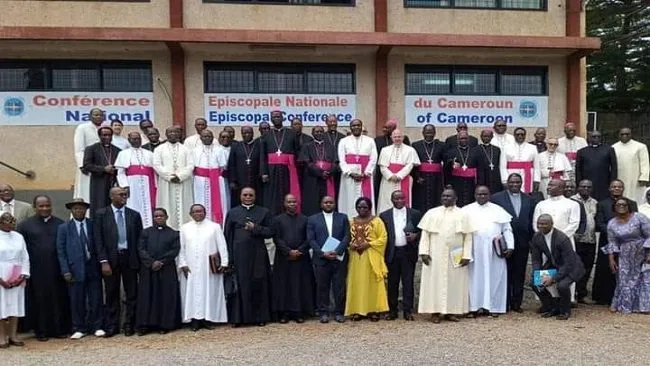Bishops of the Roman Catholic Church in Cameroon have exhorted Christians to “persevere in prayer” so as to overcome the “increasingly austere and suffocating” economic situation in the country.
This was one of the issues the Bishops discussed during their 46th annual episcopal meeting held in Ebolowa from January 7 through 14.
“The Bishops were particularly concerned about the social and economic situation which is becoming increasingly austere and suffocation for the poorest in our society. They exhorted the faithful to persevere in prayer,” wrote Mgr Jervis Kebei Kewi, Secretary General of the National Episcopal Conference.
He did not, however, disclose further details of the Bishops’ discussions on how Cameroon could overcome the economic downturn in the country.
Being the only yearly opportunity where the Bishops of Cameroon can meet to give a Catholic Church perspective to national issues facing the country, many had also expected the Bishops to elaborate on economic issues including fuel scarcity, high cost of living, and inflation, among others facing the country.
One would have expected the Bishops to prescribe practical strategies by which Cameroonians could overcome inflation, unemployment, corruption and other issues that are believed to have triggered the country’s economic woes.
The prices of goods and services have kept rising during the last few months. Many Cameroonians agree that the cost of living has nearly doubled since February 2022, when Russia-Ukraine was broke out.
From wheat prices skyrocketing as a result of the war, other foodstuff prices increased drastically as well, with construction materials having nearly doubled in price lately.
These have not however been accompanied by any wage increases; Cameroon’s minimum wage has remained fixed at FCFA 36,000 despite the dire economic situation.
In a New Year address on December 31, 2022, President Paul Biya said Cameroon was facing “exogenous shocks”, referring to the deteriorating economic situation of the country.
His government’s solution to the economic crisis, he said, included raising taxes and customs duties, curbing over reliance on imported goods by promoting made-in-Cameroon products, among other measures.
Bishops sideline Anglophone crisis
The conflict in the Northwest and Southwest Regions of Cameroon is no strange issue to the Catholic Church, which is among the entities that have been hard hit by the six-year war.
Having caused untold havoc to Catholic institutions and Christians in the Anglophone Regions, the Anglophone crisis, many say, should have featured among top issues to be discussed by the Episcopal Conference.
This is especially important after nine Catholic priests, nun and Christians were kidnapped by armed men in Manyu Division of the Southwest Regions in September 2022.
The Bishops held a general prayer for peace and unity in Cameroon during the episcopal seminar.
“The days of the seminar were marked by prayer and the celebration of the Eucharist with a fervent participation of many of the faithful for a climate of peace and social harmony in Cameroon,” said Bishop Kebei in a statement that summarises deliberations from the Episcopal Conference.
The Catholic Church has been concerned with mediating in a peaceful resolution of the Anglophone crisis, but this offer was rejected.
Both government and separatist fighters have often accused the Church of siding with the other party in the conflict, the Bamenda Archbishop, Andrew Nkea, told LaCroix, a Catholic news site, in 2021.
His Lordship Andrew Nkea, who has been outspoken about the conflict in the past, chaired the recent Episcopal Conference.
The silence of the Episcopal Conference on the crisis might mean the Catholic Church is less concerned about the Anglophone Crisis.
By Tata Mbunwe



